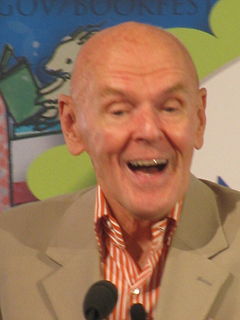A Quote by Cormac McCarthy
He thought that in the history of the world it might even be that there was more punishment than crime but he took small comfort from it.
Related Quotes
As one reads history, not in the expurgated editions written for schoolboys and passmen, but in the original authorities of each time, one is absolutely sickened, not by the crimes that the wicked have committed, but by the punishments that the good have inflicted; and a community is infinitely more brutalised by the habitual employment of punishment than it is by the occasional occurrence of crime.
Governments have tried to stop crime through punishment throughout the ages, but crime continued in the past punishment remains. Crime can only be stopped through a preventive approach in the schools. You teach the students Transcendental Meditation, and right away they'll begin using their full brain physiology sensible and they will not get sidetracked into wrong things.
The best crime stories are always about the crime and its consequences - you know, 'Crime And Punishment' is the classic. Where you have the crime, and its consequences are the story, but considering the crime and the consequences makes you think about the society in which the crime takes place, if you see what I mean.
September 11 We thought we'd outdistanced history Told our children it was nowhere near; Even when history struck Columbine, It didn't happen here. We took down the maps in the classroom, And when they were safely furled, We told the young what they wanted to hear, That they were immune from a menacing world. But history isn't a folded-up map, Or an unread textbook tome; Now we know history's a fireman's child Waiting at home alone.
We think of justice sometimes as getting what you deserve, you know? - ?what crime was committed and what is the punishment for that crime. That's how a lot of the criminal justice works. But God's justice is restorative, so it's not as interested in those same questions of "What did they do wrong?" and "What is the punishment for that?" It's more about what harm was done and how do we heal that harm, and that's a much more redemptive version. So, it definitely doesn't turn a blind eye to harm, but it does say we want to heal the wounds of that.
Men fear thought as they fear nothing else on earth - more than ruin, more even than death. Thought is subversive and revolutionary, destructive and terrible, thought is merciless to privilege, established institutions, and comfortable habits; thought is anarchic and lawless, indifferent to authority, careless of the well-tried wisdom of the ages. Thought looks into the pit of hell and is not afraid ... Thought is great and swift and free, the light of the world, and the chief glory of man.
He’s bound to have done something,” Nobby repeated. In this he was echoing the Patrician’s view of crime and punishment. If there was a crime, there should be punishment. If the specific criminal should be involved in the punishment process then this was a happy accident, but if not then any criminal would do, and since everyone was undoubtedly guilty of something, the net result was that, in general terms, justice was done.
I was not much afraid of punishment, I was only afraid of disgrace.But that I feared more than death, more than crime, more than anything in the world. I should have rejoiced if the earth had swallowed me up and stifled me in the abyss. But my invincible sense of shame prevailed over everything . It was my shame that made me impudent, and the more wickedly I behaved the bolder my fear of confession made me. I saw nothing but the horror of being found out, of being publicly proclaimed, to my face, as a thief, as a liar, and slanderer.
And I felt comfort. Finally. All I'd wanted for so long was for someone to explain everything that had happened to me in this same way. To label it neatly on a page: this leads to this leads to this. I knew, deep down, it was more complicated than that, but watching Jason, I was hopeful. He took the mess that was Macbeth and fixed it, and I had to wonder if he might, in some small way, be able to do the same for me. So I moved myself closer to him, and I'd been there ever since.
Muslims consider the honor of the Prophet Muhammad to be dearer to them than that of their parents or even themselves. To defend it is considered to be an obligation upon them. The strict punishment if found guilty of this crime under sharia, the Islamic law, is capital punishment implementable by an Islamic State. This is because the Messenger Muhammad said, ‘Whoever insults a Prophet, kill him.’





































